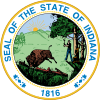
Thomas Andrews Hendricks was an American politician and lawyer from Indiana who served as the 16th governor of Indiana from 1873 to 1877 and the 21st vice president of the United States from March until his death in November 1885. Hendricks represented Indiana in the U.S. House of Representatives (1851–1855) and the U.S. Senate (1863–1869). He also represented Shelby County, Indiana, in the Indiana General Assembly (1848–1850) and as a delegate to the 1851 Indiana constitutional convention. In addition, Hendricks served as commissioner of the United States General Land Office (1855–1859). Hendricks, a popular member of the Democratic Party, was a fiscal conservative. He defended the Democratic position in the U.S. Senate during the American Civil War and Reconstruction era and voted against the Thirteenth, Fourteenth, and Fifteenth Amendments to the U.S. Constitution. He also opposed Radical Reconstruction and President Andrew Johnson's removal from office following Johnson's impeachment in the U.S. House.

Charles Warren Fairbanks was an American politician who served as the 26th vice president of the United States under President Theodore Roosevelt from 1905 to 1909. A member of the Republican Party, Fairbanks was previously a senator from Indiana from 1897 to 1905.

Oliver Hazard Perry Throck Morton, commonly known as Oliver P. Morton, was a U.S. Republican Party politician from Indiana. He served as the 14th governor of Indiana during the American Civil War, and was a stalwart ally of President Abraham Lincoln. Morton worked hard to maximize Indiana's contribution to the war effort and marginalize the obstructionists. He was a principled and effective leader who fought for equality and nationalism through the use of governmental power. His forceful pursuit of civil rights and prosecution of Copperheads and white supremacists gained him lasting enemies among the antiwar elements. Morton thwarted and neutralized the Democratic-controlled Indiana General Assembly. He exceeded his constitutional authority by calling out the militia without approval, and during the period of legislative suppression he privately financed the state government through unapproved federal and private loans. He was criticized for arresting and detaining political enemies and suspected southern sympathizers. As one of President Lincoln's "war governors", Morton made significant contributions to the war effort, more than any other man in the state, and earned the lifelong gratitude of former Union soldiers for his support.

Thomas Taggart was an Irish-American politician who was the political boss of the Democratic Party in Indiana for the first quarter of the twentieth century and remained an influential political figure in local, state, and national politics until his death. Taggart was elected auditor of Marion County, Indiana (1886–1894), and mayor of Indianapolis. His mayoral administration supported public improvements, most notably the formation of the city's park and boulevard system. He also served as a member of the Democratic National Committee (1900–1916) and as its chairman (1904–1908). Taggart was appointed to the U.S. Senate in March 1916, but lost the seat in the November election.
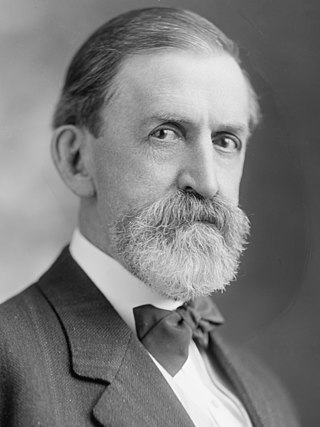
John Worth Kern was a Democratic United States Senator from Indiana. While the title was not official, he is considered to be the first Senate majority leader, while serving concurrently as chairman of the Senate Democratic Caucus. He was also the Democratic vice presidential nominee in the 1908 presidential election.

Edgar Doud Whitcomb was an American attorney, writer and politician, who served as the 43rd governor of Indiana. His term as governor began a major rift in the Indiana Republican Party as urban Republicans became more numerous than rural Republicans, leading to a shift in the priorities of the party leadership.
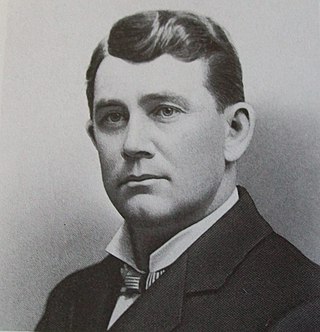
James Franklin Hanly was an American politician who served as a congressman from Indiana from 1895 until 1897, and was the 26th governor of Indiana from 1905 to 1909. He was the founder of Hanly's Flying Squadron, which advocated prohibition nationally and played an important role in arousing public support for prohibition.

Edward L. Jackson was an American attorney, judge and politician, elected the 32nd governor of the U.S. state of Indiana from January 12, 1925, to January 14, 1929. He had also been elected as Secretary of State of Indiana.
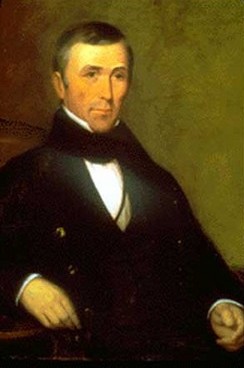
Ratliff Boon was an American politician who briefly served as the second Governor of Indiana — taking office following the resignation of Governor Jonathan Jennings, whom he served as lieutenant governor under, after his election to Congress, and subsequently serving again as lieutenant governor under Governor William Hendricks — and a six-term member of the United States House of Representatives. A prominent politician in the state, Boon was instrumental in the formation of the state Democratic Party, and he supported President Andrew Jackson's policies while in the House.

Harry Guyer Leslie was an American politician and Indiana Republican Party member, speaker of the state house and the 33rd governor of the state. His term as governor was marked by the start of the Great Depression.

James Putnam Goodrich was an American politician and member of the Republican Party who served as the 29th governor of Indiana from 1917 to 1921. His term focused on reforming the operations of the state government and overseeing the state's contributions to World War I. He nearly died twice during his term, and spent a considerable time bedridden. Following his term as governor, he became increasingly wealthy from his business interests and owned a controlling share in many companies.
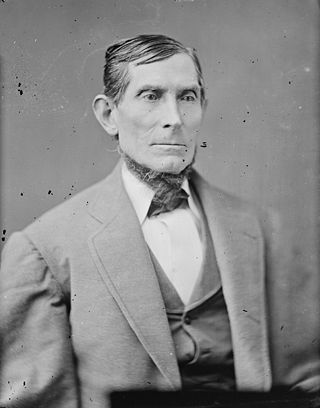
James Douglas Williams, nicknamed Blue Jeans Bill, was an American farmer and Democratic politician who held public office in Indiana for four decades, and was the only farmer elected as the governor of Indiana, serving from 1877 to 1880. He also spent twenty-eight years in the Indiana General Assembly, and was well known for his frugality and advocacy of agricultural development.

Isaac Pusey Gray was the 18th and 20th governor of the U.S. state of Indiana from 1880 to 1881 and from 1885 to 1889. Originally a Republican, he oversaw the forceful passage of the post-American Civil War constitutional amendments while he was a member of the Indiana Senate. He became a Democrat following the corruption of the Administration of Ulysses S. Grant but was regularly stymied by his Democratic adversaries who constantly referred to his tactics while a Republican, earning him the nickname "Sisyphus of the Wabash."

Claude Matthews was an American politician who served as the 23rd governor of the U.S. state of Indiana from 1893 to 1897. A farmer, he was nominated to prevent the loss of voters to the Populist Party. The Panic of 1893 occurred just before he took office, leading to severe economic problems during his term. Republicans took the Indiana General Assembly in the 1894 mid-term election and repudiated many of the Democrats' laws, leading to violence in the assembly. A popular party figure when he left office, he was a nominee to run for president at the 1896 Democratic National Convention, but lost his bid for the nomination to William Jennings Bryan.
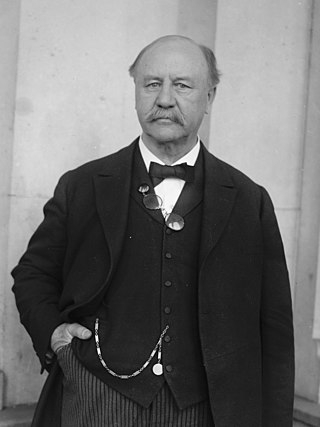
Samuel Moffett Ralston was an American politician of the Democratic Party who served as the 28th governor of the U.S. state of Indiana and a United States senator from Indiana.

Henry Frederick Schricker was an American politician who served as the 36th and 38th Governor of the U.S. state of Indiana from 1941 to 1945 and from 1949 to 1953. He is the only Indiana governor elected to two non-consecutive terms, and the only governor between 1852 and 1977 to be elected to more than one term in office. His terms were marked by strong opposition party control of the Indiana General Assembly, which attempted to remove powers from the governor that had been granted during the Great Depression. Schricker fought the attempt in the state courts, and although his power was significantly reduced, the Indiana Supreme Court ruled in the case of Tucker v. Indiana that the governor was the chief executive of the state, and the legislature could not pass legislation that interfered with the division of powers.

Harold Willis Handley was the 40th governor of the U.S. state of Indiana from 1957 to 1961. A veteran of World War II, and furniture salesman by trade, Handley began his political career as a state senator. Thanks to his longtime friendship with state party leader and United States Senator William E. Jenner, he was able to secure the nomination to run for lieutenant governor in 1952, during which time he opposed many of the actions of Governor George N. Craig. His popularity rose among the conservative leadership of the Indiana Republican Party and aided him in winning the nomination and subsequent election as governor in 1956.

Albert Gallatin Porter was an American politician who served as the 19th governor of Indiana from 1881 to 1885 and as a United States Congressman from 1859 to 1863. Originally a Democrat, he joined the Republican Party in 1856 after being expelled by the pro-slavery faction of the Democratic Party. Only the second person born in Indiana to become the state's governor, he reluctantly accepted his party's nomination to run. His term saw the start of Indiana's industrialization that continued for several decades. During the second half of his term a strong Democratic majority took control of the Indiana General Assembly and revoked all of the governor's appointment powers and other authorities, weakening the position to its lowest level in the history of the state.

Winfield Taylor Durbin was an American politician serving as the 25th governor of the U.S. state of Indiana from 1901 to 1905. His term focused on progressive legislation and suppression of white cap vigilante organizations operating in the southern part of the state. He was the seventh and last veteran of the American Civil War to serve as governor.
William Lamborn Taylor was an American lawyer and politician who served as the seventeenth Indiana Attorney General from November 18, 1898 to January 1, 1903.

